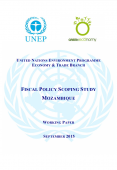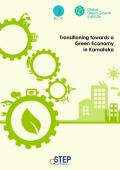
Mozambique faces a range of environmental challenges and risks, including deforestation; declining fish stocks; land, water and air pollution; and loss and degradation in wetlands and rivers ,which could all be compounded by climate change and a growing population.
The focus of this report is to identify policy options for Green Fiscal Reform (GFR) in Mozambique. These policy options include the use of taxation and pricing measures, which raise revenues or lower expenditures, while furthering environmental goals by addressing environmental externalities and incentivizing green investment.
In addition to these policies, a range of viable GFR policy options that the government could consider were identified through research on the government’s environmental challenges and fiscal policy landscape, a national validation workshop, as well as a literature review and expert consultations on global best practices. These policy options could facilitate Mozambique’s green economy transformation by shifting behaviour and investment decisions, while concurrently helping to create fiscal space that could be used to promote social and green economy investments.
This report reviews trends and progress on climate change mitigation policies in 34 OECD countries and 10 partner economies (Brazil, China, Colombia, Costa Rica, Indonesia, India, Latvia, Lithuania, the Russian Federation and South Africa), as well as in the European Union. Together, these countries account for over 80% of global GHG emissions. It covers three areas: 1) mitigation targets and goals, 2) carbon pricing instruments (such as energy and carbon taxation, emissions trading systems, as well as support for fossil fuels) and 3) key domestic policy settings in the energy and other sectors (including renewable energy, power generation and transport, innovation and R&D, and mitigation policies in agriculture, forestry, industry and waste sectors). The report is accompanied by an online country profiles tool containing more detailed information.
The paper investigates the current practices of the green economy, and challenges and opportunities in the Limpopo Province of South Africa. The paper is based on a baseline study designed to gather data from key informants in Limpopo provincial, district and local municipalities. Twenty-three key informants in the province were interviewed. Primary data collected from key informants was supplemented by secondary data from document reviews. Descriptive statistics were used to analyse data on the current practices of green economy, and challenges and opportunities in the province. Findings from the study suggest that there is generally significant awareness of the green economy concept across the provincial district and local municipalities in Limpopo Province. However, there are gaps in terms of information gathering, storage and sharing on green economy activities in the district municipalities, provincial and national departments.
Cities are engines of economic growth and social change. About 85% of global GDP in 2015 was generated in cities. By 2050, two-thirds of the global population will live in urban areas. Compact, connected and efficient cities can generate stronger growth and job creation, alleviate poverty and reduce investment costs, as well as improve quality of life through lower air pollution and traffic congestion. Better, more resilient models of urban development are particularly critical for rapidly urbanizing cities in the developing world. International city networks, such as the C40 Cities Climate Leadership Group, Local Governments for Sustainability (ICLEI) and United Cities and Local Governments (UCLG), are scaling up the sharing of best practices and developing initiatives to facilitate new flows of finance, enabling more ambitious action on climate change. Altogether, low-carbon urban actions available today could generate a stream of savings in the period to 2050 with a current value of US$16.6 trillion.

